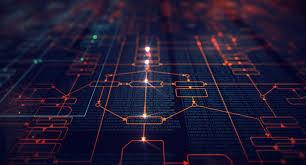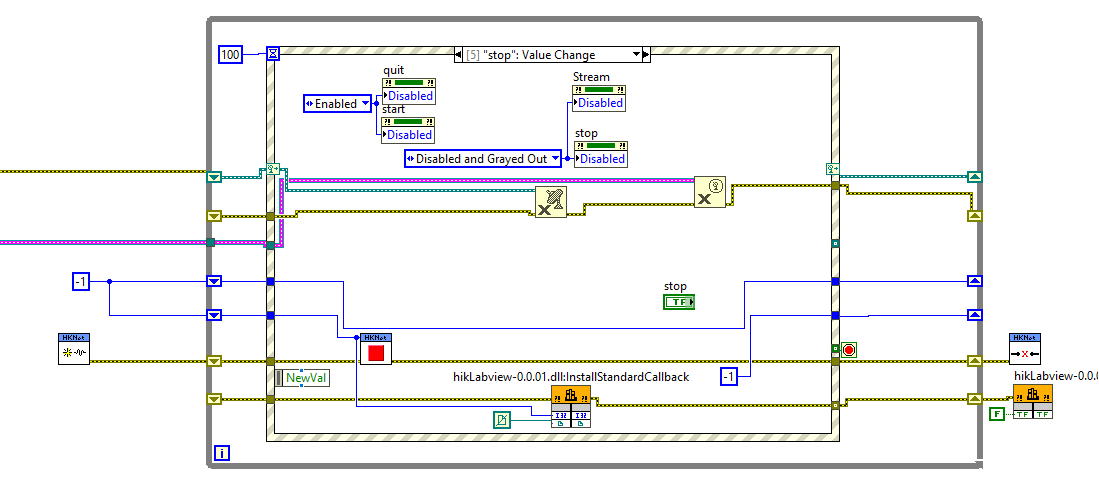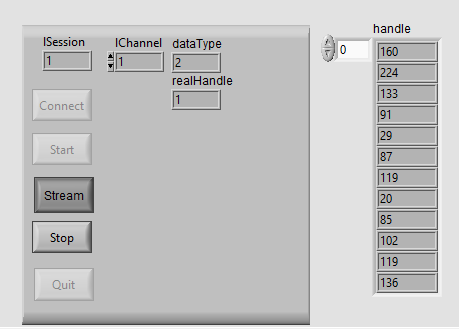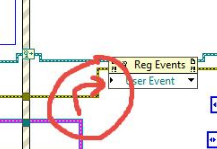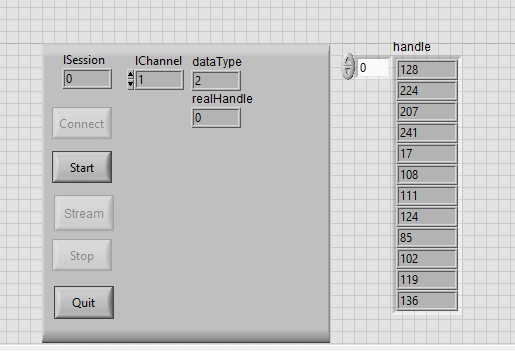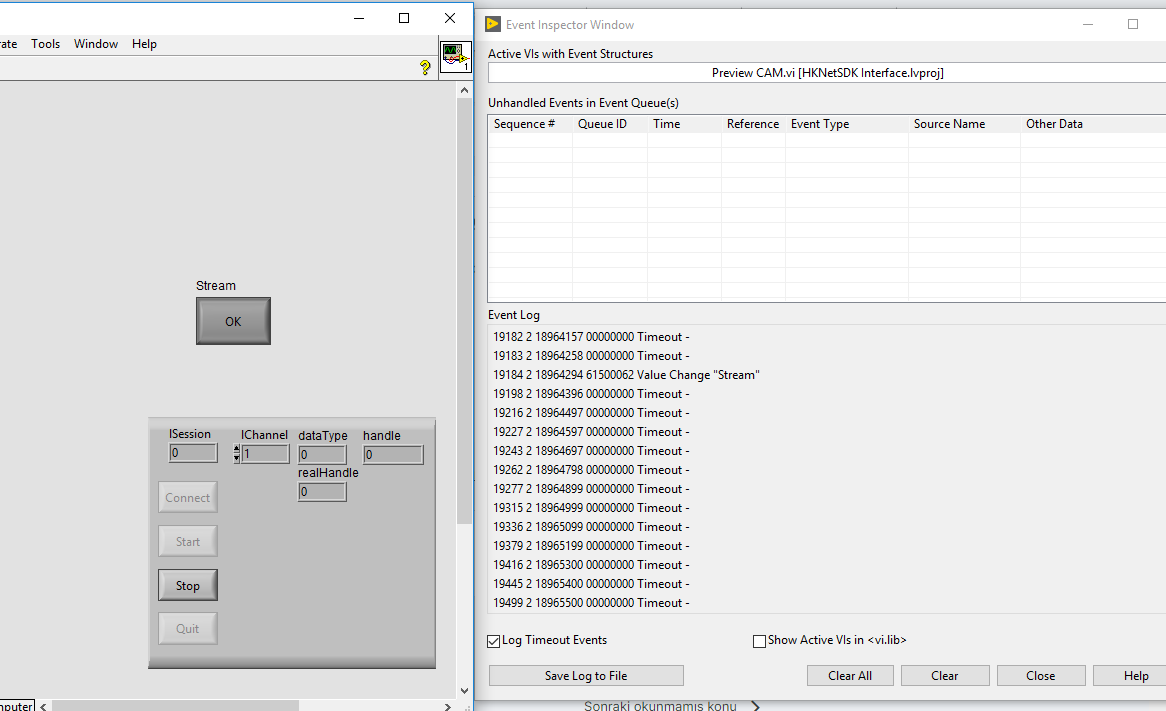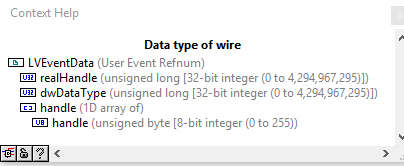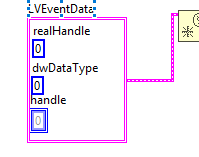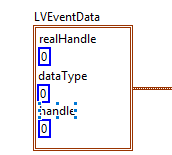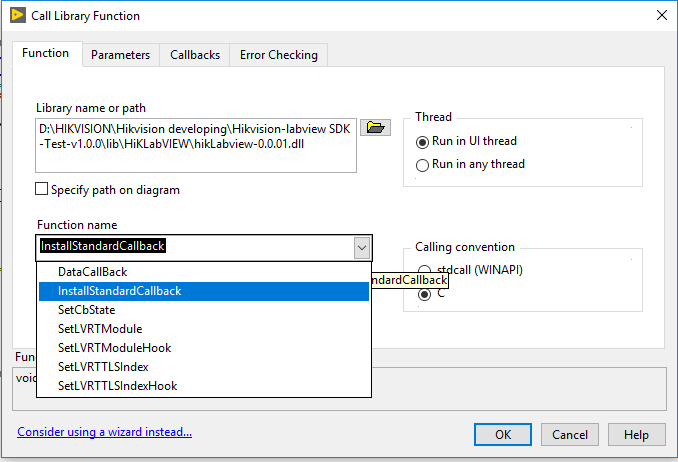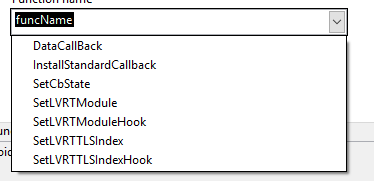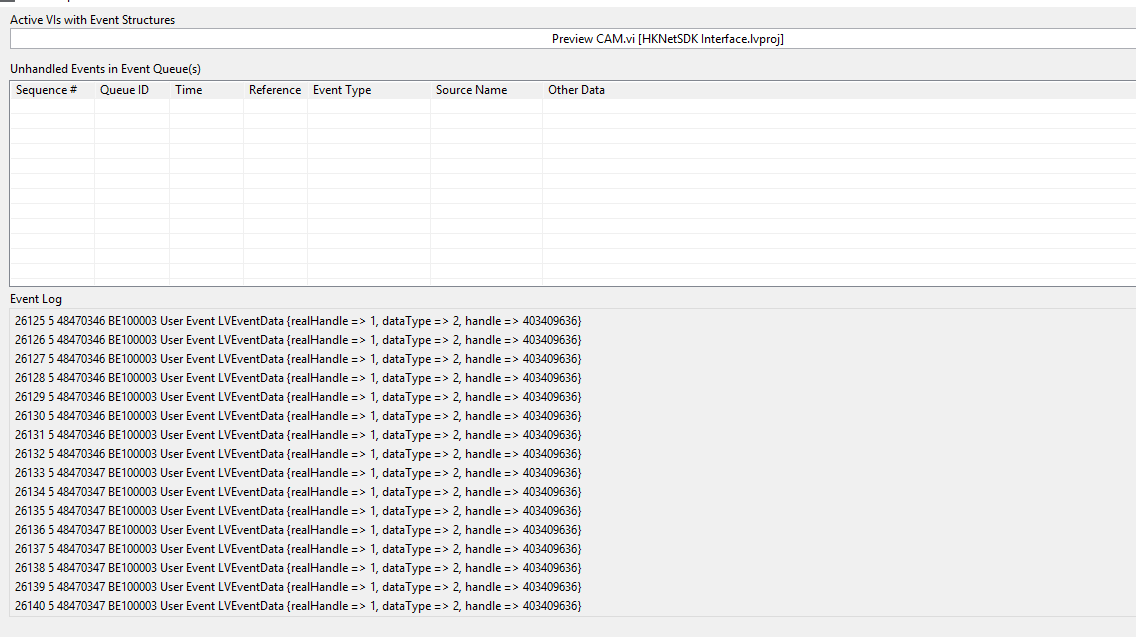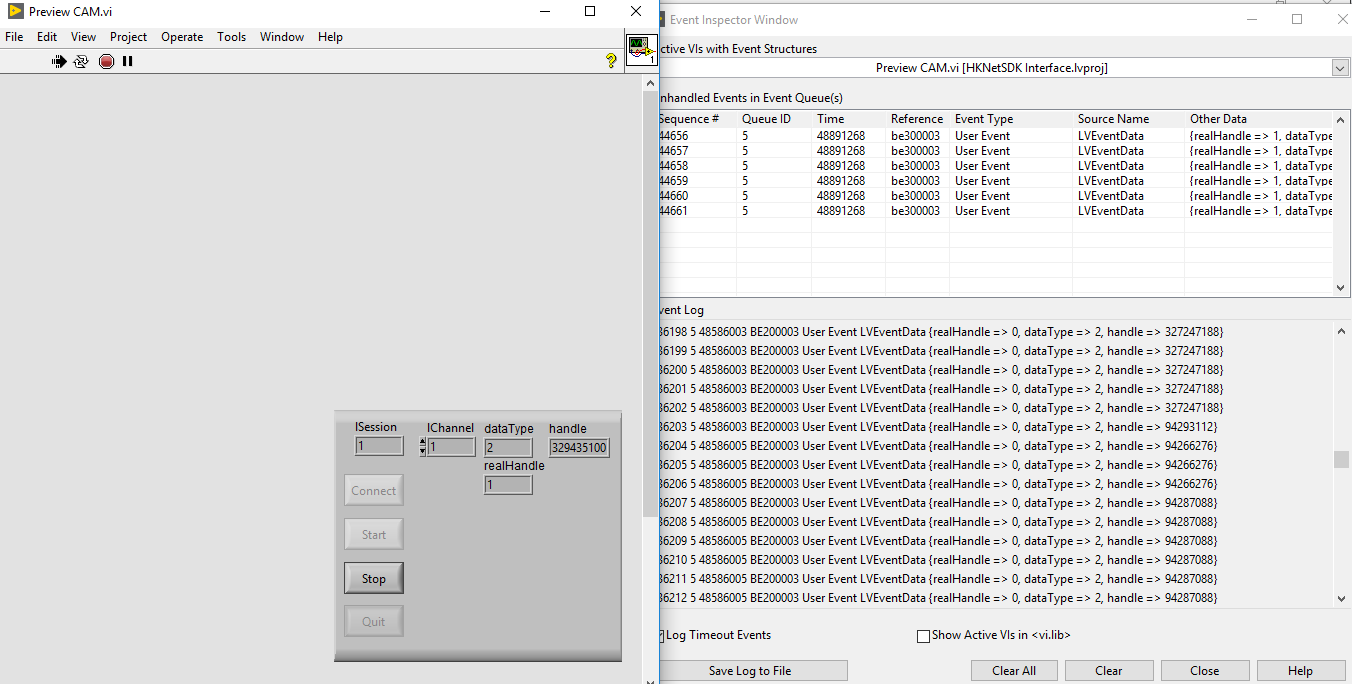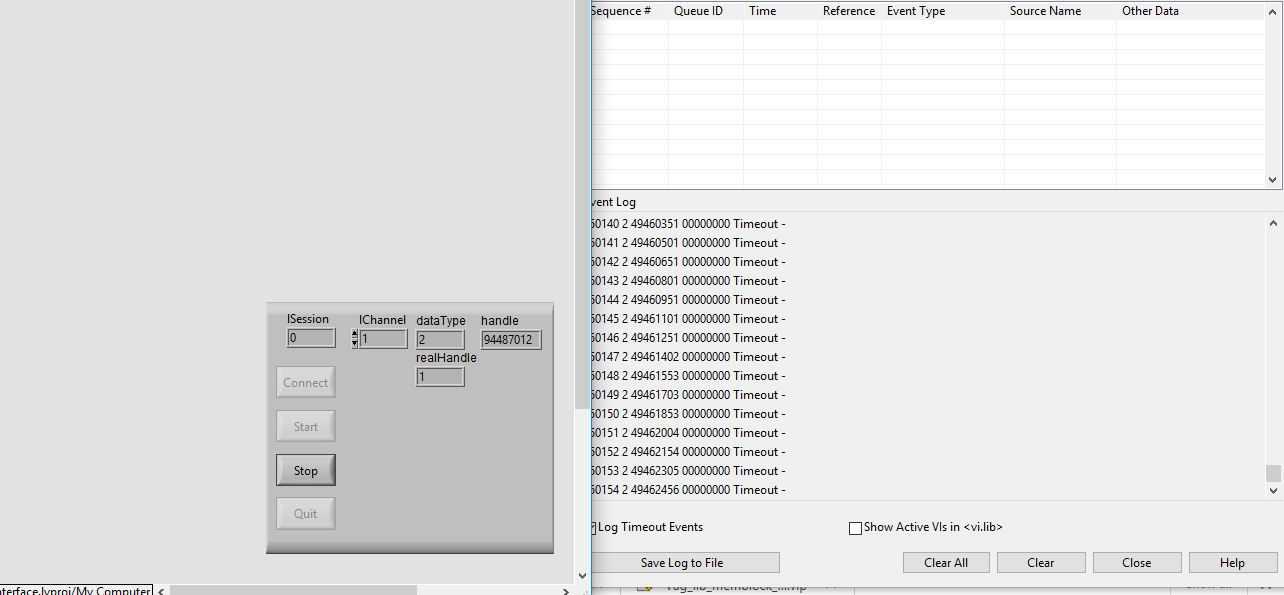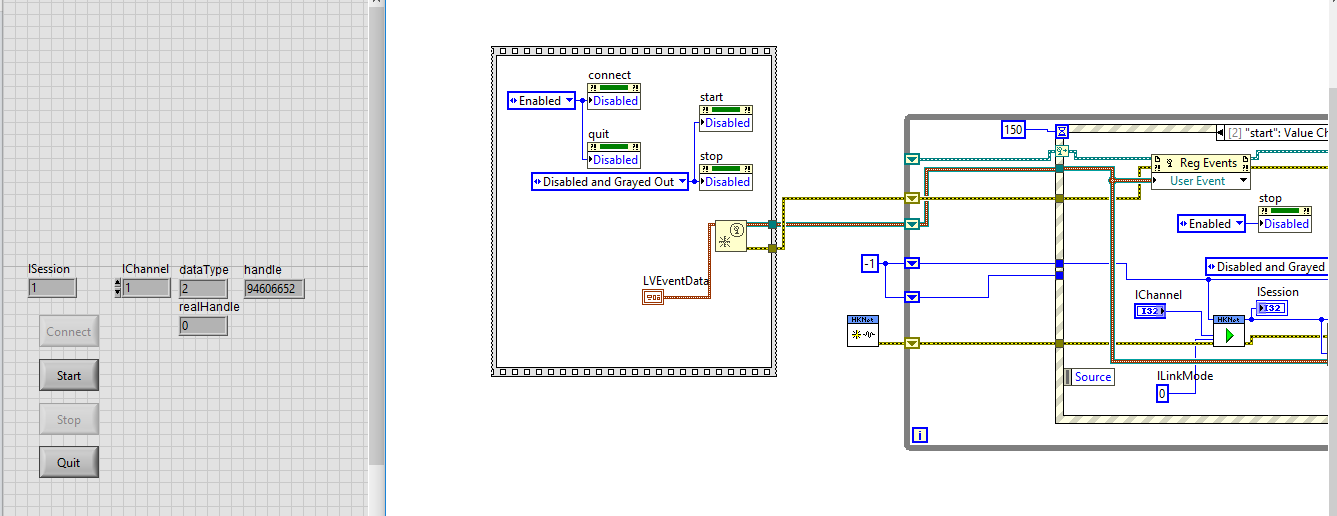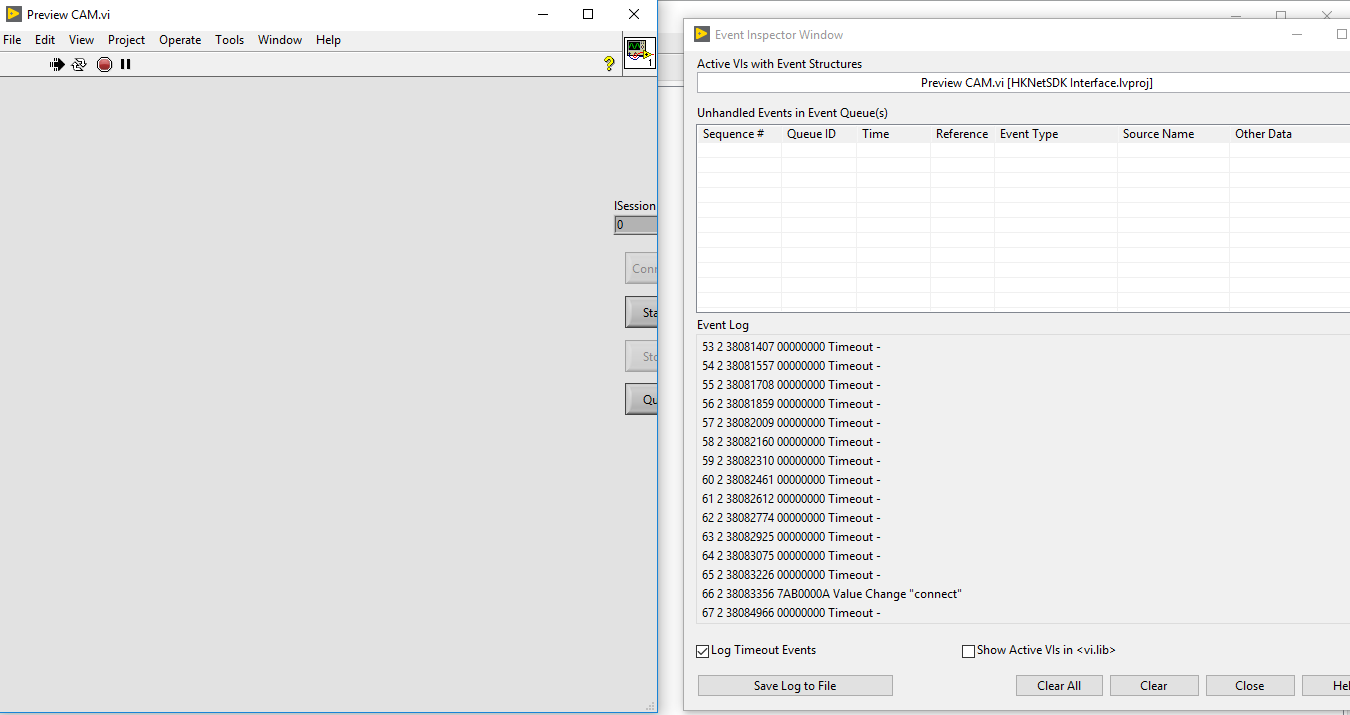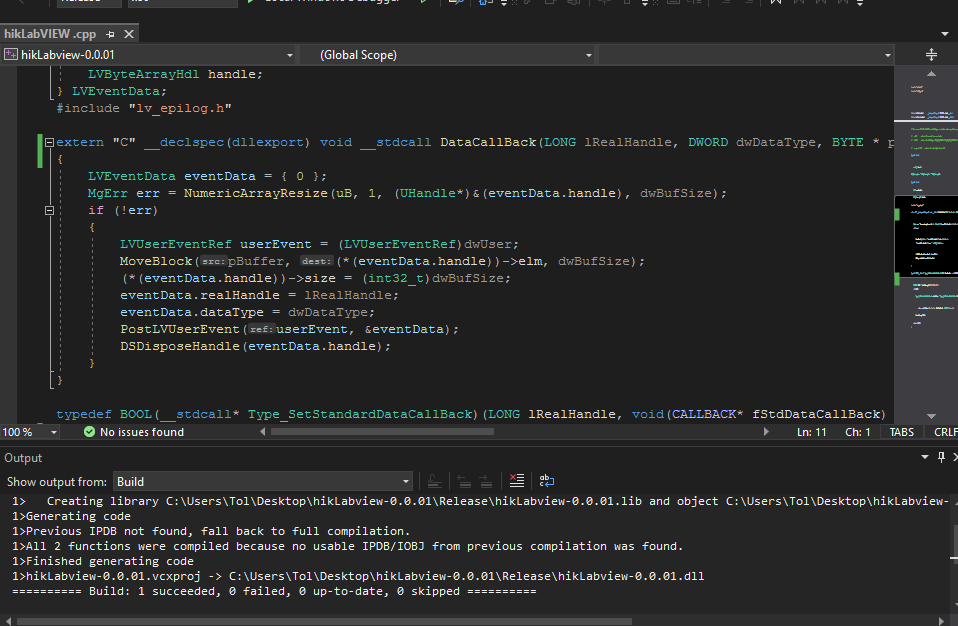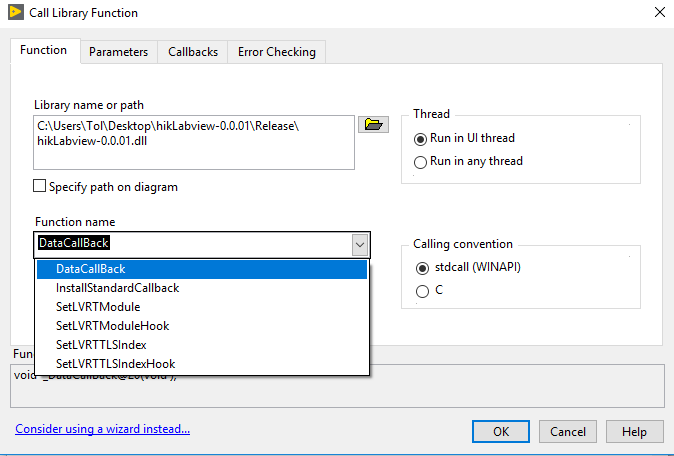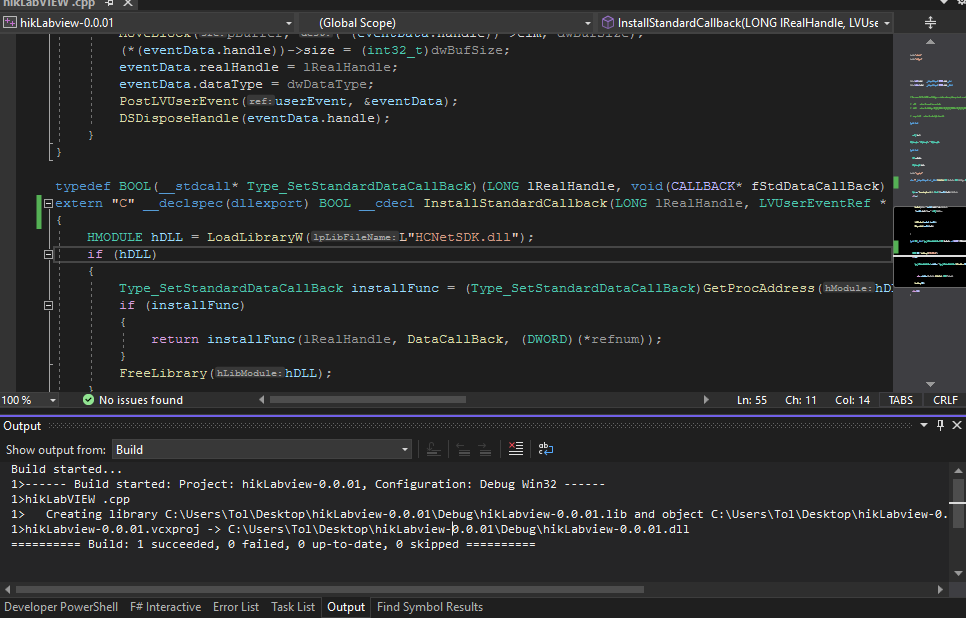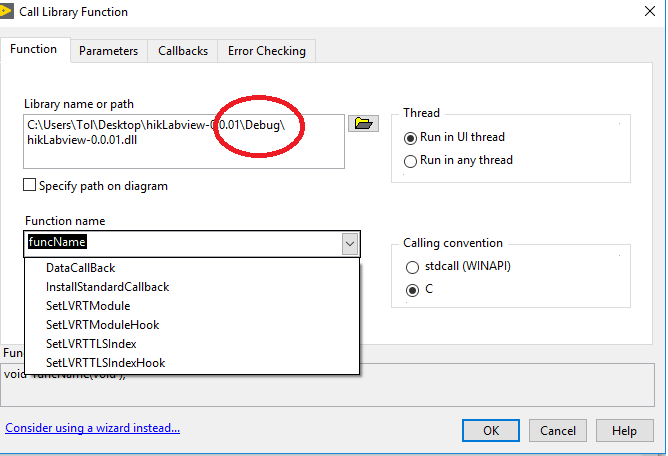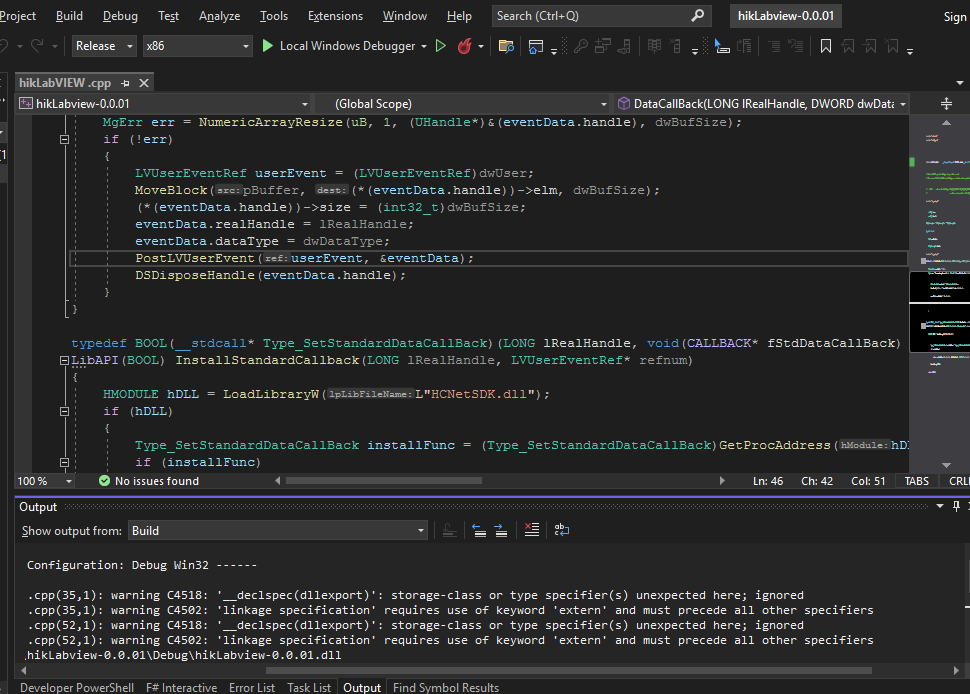-
Posts
209 -
Joined
-
Last visited
Content Type
Profiles
Forums
Downloads
Gallery
Everything posted by alvise
-
.thumb.jpeg.461a15394c503dea2533b15f79cffcee.jpeg)
Using the DLL files of an application compiled with C# with labview
alvise replied to alvise's topic in LabVIEW General
I don't experiment too much as I don't want to make mistakes. I want to run sensible tests. I read your previous post maybe 10-20 times. I think I need to pass a "Not a Refnum" to the installcalback function you describe here and create it in the stop event frame. Of course I tried that, no difference. -
.thumb.jpeg.461a15394c503dea2533b15f79cffcee.jpeg)
Using the DLL files of an application compiled with C# with labview
alvise replied to alvise's topic in LabVIEW General
From what I understand so far, uninstallcalback should be created in dll and use in labview with Not A refnum (no reference) to delete callback if stop button is pressed. The dll file should understand this no-reference status and run the remove function and remove the callback.It should release the library for that. I need to create 2 parameters in this function.1-Return 2- for ''Not A Refnum'' connection. I'm experimenting by doing research and commenting out the existing code. But I haven't been able to find exactly how the code needs to be able to perform the callback function. I came to the following conclusion.I guess it should be created as follows, right? typedef BOOL(__stdcall* Type_SetStandardDataCallBack)(LONG lRealHandle, void(CALLBACK* fStdDataCallBack) (LONG lRealHandle, DWORD dwDataType, BYTE* pBuffer, DWORD dwBufSize, DWORD dwUser), DWORD dwUser); extern "C" __declspec(dllexport) BOOL __cdecl unInstallStandardCallback(LONG lRealHandle, LVUserEventRef * refnum) { HMODULE hDLL = LoadLibraryW(L"HCNetSDK.dll"); if (hDLL) { Type_SetStandardDataCallBack uninstallFunc = (Type_SetStandardDataCallBack)GetProcAddress(hDLL, "NET_DVR_SetStandardDataCallBack"); if (uninstallFunc) { FreeLibrary(hDLL); } } } I don't know if I have established a correct logic Either I'm really walking towards a light or at the end of the road I will realize that that light is the light that the firefly emits to catch its prey, of course, it is too late for everything now -
.thumb.jpeg.461a15394c503dea2533b15f79cffcee.jpeg)
Using the DLL files of an application compiled with C# with labview
alvise replied to alvise's topic in LabVIEW General
I try to be very careful. But sometimes accidents like this happen.Thanks for your warning. -For example, if I run VI (if I press each key properly), the data (numbers) in the array are constantly changing, and on this basis, I say that the data can be read. But sometimes (perhaps after running and stopping VI a few times) the string contains data from the previous run and the data (number) remains constant in the array. I interpret this situation as no data read. I don't know how self-explanatory it was. Referring to the car example also reminded me how dire my situation was. -I've been reading over and over when you wrote how to create -installcallback.vi. But I didn't understand exactly what to do. -
.thumb.jpeg.461a15394c503dea2533b15f79cffcee.jpeg)
Using the DLL files of an application compiled with C# with labview
alvise replied to alvise's topic in LabVIEW General
At first, U32 was a numeric number, I directly converted it to an array and set the data type to U8. Later, when the problem occurred, I tried to test it with U32 numeric again. But when I got picture as U8 I was testing as U8 Later when making changes I forgot to change it back to U8. I think the problem still persists. Again sometimes the data is not being read. Preview CAM-6.vi -
.thumb.jpeg.461a15394c503dea2533b15f79cffcee.jpeg)
Using the DLL files of an application compiled with C# with labview
alvise replied to alvise's topic in LabVIEW General
I guess that's exactly why sometimes it gets the data and sometimes it doesn't, I guess what you said confirms what you said after some testing. -
.thumb.jpeg.461a15394c503dea2533b15f79cffcee.jpeg)
Using the DLL files of an application compiled with C# with labview
alvise replied to alvise's topic in LabVIEW General
a moment of distraction After making changes, I started to read data. Sometimes the data can be read and sometimes not. -
.thumb.jpeg.461a15394c503dea2533b15f79cffcee.jpeg)
Using the DLL files of an application compiled with C# with labview
alvise replied to alvise's topic in LabVIEW General
As a precaution against forgetting the Stream button, make a change as follows. Preview CAM-5.vi -
.thumb.jpeg.461a15394c503dea2533b15f79cffcee.jpeg)
Using the DLL files of an application compiled with C# with labview
alvise replied to alvise's topic in LabVIEW General
After making changes as below, nothing changed. Preview CAM-4.vi -
.thumb.jpeg.461a15394c503dea2533b15f79cffcee.jpeg)
Using the DLL files of an application compiled with C# with labview
alvise replied to alvise's topic in LabVIEW General
After closing and reopening the project completely I am facing a situation as below.dwdatatype returns value as 0. -
.thumb.jpeg.461a15394c503dea2533b15f79cffcee.jpeg)
Using the DLL files of an application compiled with C# with labview
alvise replied to alvise's topic in LabVIEW General
What I mean here is that currently the event structure is not reading any data. And that's exactly what I mean. -
.thumb.jpeg.461a15394c503dea2533b15f79cffcee.jpeg)
Using the DLL files of an application compiled with C# with labview
alvise replied to alvise's topic in LabVIEW General
-
.thumb.jpeg.461a15394c503dea2533b15f79cffcee.jpeg)
Using the DLL files of an application compiled with C# with labview
alvise replied to alvise's topic in LabVIEW General
I made the correction as you said, and I am getting the following log records. Currently, no Realhandle data is visible. EventLog-15.txt -
.thumb.jpeg.461a15394c503dea2533b15f79cffcee.jpeg)
Using the DLL files of an application compiled with C# with labview
alvise replied to alvise's topic in LabVIEW General
No need for audio data. -
.thumb.jpeg.461a15394c503dea2533b15f79cffcee.jpeg)
Using the DLL files of an application compiled with C# with labview
alvise replied to alvise's topic in LabVIEW General
By the way, isn't it necessary to use this function and this function? Because I'm currently using this function. Which cluster do I need to fix? are you talking about this? What I don't understand is why sometimes Real Handle information is read in "Event Log" and sometimes not. I made 2 different log records below.no real handle info.txthas real handle info.txt -As I understand "callback" is only required for "Standard Data Callback", it cannot be used to read required video data. But I'm reviewing the function here it's talking about streaming video data. -
.thumb.jpeg.461a15394c503dea2533b15f79cffcee.jpeg)
Using the DLL files of an application compiled with C# with labview
alvise replied to alvise's topic in LabVIEW General
Right now I made a change as you said. I get the following output. Is it normal to get an output like the one below? Because sometimes I get Realhandle data. Sometimes I don't. I made the fix as follows. Preview CAM-3.vi EventLog-1.txt -
.thumb.jpeg.461a15394c503dea2533b15f79cffcee.jpeg)
Using the DLL files of an application compiled with C# with labview
alvise replied to alvise's topic in LabVIEW General
I've currently compiled and run the code you suggested last time. Since the true flag is not sent in the dll file, I get the following output when run. EventLog.txt Why was the "Datacallback" function in the picture above created, is it necessary to get information using that function? Now I'm trying to figure out how can I send the true-falsa flag. If I'm not mistaken, I had to create something like below, but now the labview is crashing. Preview CAM-2.vi -
.thumb.jpeg.461a15394c503dea2533b15f79cffcee.jpeg)
Using the DLL files of an application compiled with C# with labview
alvise replied to alvise's topic in LabVIEW General
The reason I left this '' LVEventData eventData = { 0 }; MgErr err = NumericArrayResize(uB, 1, (UHandle*)&(eventData.handle), dwBufSize); ''out A simple mistake to define !err.Didn't realize I hadn't put the ('!'') sign. -Do you think I should create it as follows? #include "extcode.h" #include "hosttype.h" #include "HCNetSDK.h" #define LibAPI(retval) __declspec(dllexport) EXTERNC retval __cdecl #define Callback(retval) __declspec(dllexport) EXTERNC retval __stdcall // Define LabVIEW specific datatypes to pass data as event // This assumes that the LabVIEW event datatype is a cluster containing following elements in exactly that order!!! // cluster // int32 contains the current live view handle // uInt32 contains the dwDataType (NET_DVR_SYSHEAD, NET_DVR_STD_VIDEODATA, NET_DVR_STD_AUDIODATA, NET_DVR_PRIVATE_DATA, // or others as documented in the NET_DVR_SetStandardDataCallBack() function // array of uInt8 contains the actual byte stream data #include "lv_prolog.h" typedef struct { int32_t size; uint8_t elm[1]; } LVByteArrayRec, * LVByteArrayPtr, ** LVByteArrayHdl;// ** LVByteArrayHdl;pointer to a pointer typedef struct { LONG realHandle; DWORD dataType; LVByteArrayHdl handle; } LVEventData; #include "lv_epilog.h" extern "C" __declspec(dllexport) void __cdecl SetCbState(LVBoolean * state); // where Standard Boolean type case is set: typedef uInt8 LVBoolean LVBoolean cbState = LVBooleanFalse; // always set to false on startup extern "C" __declspec(dllexport) void __cdecl SetCbState(LVBoolean * state) { cbState = *state; } // cbstate does a state reassessment.True or False extern "C" __declspec(dllexport) void __stdcall DataCallBack(LONG lRealHandle, DWORD dwDataType, BYTE * pBuffer, DWORD dwBufSize, DWORD dwUser) { LVEventData eventData = { 0 }; MgErr err = NumericArrayResize(uB, 1, (UHandle*)&(eventData.handle), dwBufSize); if (cbState == LVBooleanTrue && !err)// send callback data if there is no error and the cbstatus is true. { LVEventData eventData = { 0 }; MgErr err = NumericArrayResize(uB, 1, (UHandle*)&(eventData.handle), dwBufSize); LVUserEventRef userEvent = (LVUserEventRef)dwUser; MoveBlock(pBuffer, (*(eventData.handle))->elm, dwBufSize); (*(eventData.handle))->size = (int32_t)dwBufSize; eventData.realHandle = lRealHandle; eventData.dataType = dwDataType; PostLVUserEvent(userEvent, &eventData); DSDisposeHandle(eventData.handle); } } //If the above if condition does not occur, the LVUserEventRef here does not take a value. typedef BOOL(__stdcall* Type_SetStandardDataCallBack)(LONG lRealHandle, void(CALLBACK* fStdDataCallBack) (LONG lRealHandle, DWORD dwDataType, BYTE* pBuffer, DWORD dwBufSize, DWORD dwUser), DWORD dwUser); extern "C" __declspec(dllexport) BOOL __cdecl InstallStandardCallback(LONG lRealHandle, LVUserEventRef * refnum) { HMODULE hDLL = LoadLibraryW(L"HCNetSDK.dll"); if (hDLL) { Type_SetStandardDataCallBack installFunc = (Type_SetStandardDataCallBack)GetProcAddress(hDLL, "NET_DVR_SetStandardDataCallBack"); if (installFunc) { return installFunc(lRealHandle, DataCallBack, (DWORD)(*refnum)); } FreeLibrary(hDLL); } return FALSE; } It is necessary to create this in the dll code again, right? -
.thumb.jpeg.461a15394c503dea2533b15f79cffcee.jpeg)
Using the DLL files of an application compiled with C# with labview
alvise replied to alvise's topic in LabVIEW General
#include "extcode.h" #include "hosttype.h" #include "HCNetSDK.h" #define LibAPI(retval) __declspec(dllexport) EXTERNC retval __cdecl #define Callback(retval) __declspec(dllexport) EXTERNC retval __stdcall // Define LabVIEW specific datatypes to pass data as event // This assumes that the LabVIEW event datatype is a cluster containing following elements in exactly that order!!! // cluster // int32 contains the current live view handle // uInt32 contains the dwDataType (NET_DVR_SYSHEAD, NET_DVR_STD_VIDEODATA, NET_DVR_STD_AUDIODATA, NET_DVR_PRIVATE_DATA, // or others as documented in the NET_DVR_SetStandardDataCallBack() function // array of uInt8 contains the actual byte stream data #include "lv_prolog.h" typedef struct { int32_t size; uint8_t elm[1]; } LVByteArrayRec, * LVByteArrayPtr, ** LVByteArrayHdl;// ** LVByteArrayHdl;pointer to a pointer typedef struct { LONG realHandle; DWORD dataType; LVByteArrayHdl handle; } LVEventData; #include "lv_epilog.h" extern "C" __declspec(dllexport) void __cdecl SetCbState(LVBoolean * state); // where Standard Boolean type case is set: typedef uInt8 LVBoolean LVBoolean cbState = LVBooleanFalse; // always set to false on startup extern "C" __declspec(dllexport) void __cdecl SetCbState(LVBoolean * state) { cbState = *state; } // cbstate does a state reassessment.True or False extern "C" __declspec(dllexport) void __stdcall DataCallBack(LONG lRealHandle, DWORD dwDataType, BYTE * pBuffer, DWORD dwBufSize, DWORD dwUser) { LVEventData eventData = { 0 }; MgErr err = NumericArrayResize(uB, 1, (UHandle*)&(eventData.handle), dwBufSize); if (cbState == LVBooleanTrue && err)// send callback data if there is no error and the cbstatus is true. { LVUserEventRef userEvent = (LVUserEventRef)dwUser; MoveBlock(pBuffer, (*(eventData.handle))->elm, dwBufSize); (*(eventData.handle))->size = (int32_t)dwBufSize; eventData.realHandle = lRealHandle; eventData.dataType = dwDataType; PostLVUserEvent(userEvent, &eventData); DSDisposeHandle(eventData.handle); } } //If the above if condition does not occur, the LVUserEventRef here does not take a value. typedef BOOL(__stdcall* Type_SetStandardDataCallBack)(LONG lRealHandle, void(CALLBACK* fStdDataCallBack) (LONG lRealHandle, DWORD dwDataType, BYTE* pBuffer, DWORD dwBufSize, DWORD dwUser), DWORD dwUser); extern "C" __declspec(dllexport) BOOL __cdecl InstallStandardCallback(LONG lRealHandle, LVUserEventRef * refnum) { HMODULE hDLL = LoadLibraryW(L"HCNetSDK.dll"); if (hDLL) { Type_SetStandardDataCallBack installFunc = (Type_SetStandardDataCallBack)GetProcAddress(hDLL, "NET_DVR_SetStandardDataCallBack"); if (installFunc) { return installFunc(lRealHandle, DataCallBack, (DWORD)(*refnum)); } FreeLibrary(hDLL); } return FALSE; } I guess you meant something like.By the way, it compiles without problems. this.As far as I understand, I made comments -
.thumb.jpeg.461a15394c503dea2533b15f79cffcee.jpeg)
Using the DLL files of an application compiled with C# with labview
alvise replied to alvise's topic in LabVIEW General
-Boolean variable switch must be created inside the dll file and it is necessary to send a value (1-0) to it from the labview, right? -
.thumb.jpeg.461a15394c503dea2533b15f79cffcee.jpeg)
Using the DLL files of an application compiled with C# with labview
alvise replied to alvise's topic in LabVIEW General
yes, I guess it allocates a new handle to each event. I'm not playing with something dangerous, am I ? Does your loop manage to process events in time? - I've included a few photos of the test below, although I don't quite understand what you're saying here. I think there is an unstable situation. Sometimes when I run the VI the values refresh like crazy, Other times if I stop the VI and run it again nothing is read. -
.thumb.jpeg.461a15394c503dea2533b15f79cffcee.jpeg)
Using the DLL files of an application compiled with C# with labview
alvise replied to alvise's topic in LabVIEW General
Taking your suggestions into account, I updated the VI as follows. Currently there is no problem, at least the labview does not crash and I get some values as output. Of course, I don't know if there are errors. What is the reason why the Handle value is sometimes flickering on the screen? Preview CAM-1.vi -
.thumb.jpeg.461a15394c503dea2533b15f79cffcee.jpeg)
Using the DLL files of an application compiled with C# with labview
alvise replied to alvise's topic in LabVIEW General
According to what you said step by step, I made a fix as follows, but if I press the start button, the labview crashes. Hikvision-labviewSDK-Test-v1.0.0.rar -
.thumb.jpeg.461a15394c503dea2533b15f79cffcee.jpeg)
Using the DLL files of an application compiled with C# with labview
alvise replied to alvise's topic in LabVIEW General
Upon your suggestion, I deleted the folder named release and created it again. I can see the labview DataCallBack and InstallStandardCallback functions. I guess this is the next step. -
.thumb.jpeg.461a15394c503dea2533b15f79cffcee.jpeg)
Using the DLL files of an application compiled with C# with labview
alvise replied to alvise's topic in LabVIEW General
after editing no errors or warnings as below. When you call the dll file from the debug file here, it has function names as follows. -
.thumb.jpeg.461a15394c503dea2533b15f79cffcee.jpeg)
Using the DLL files of an application compiled with C# with labview
alvise replied to alvise's topic in LabVIEW General

